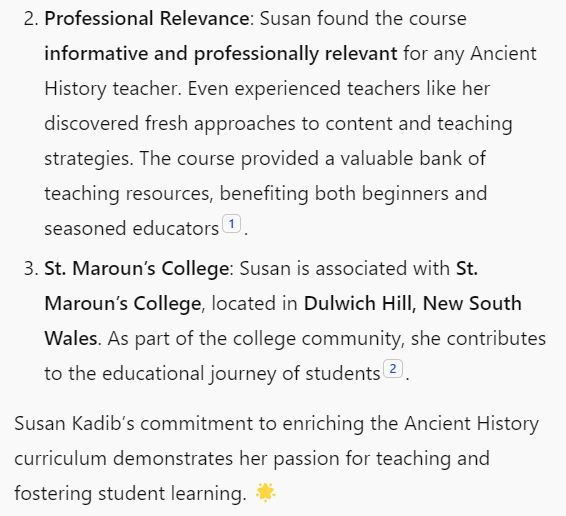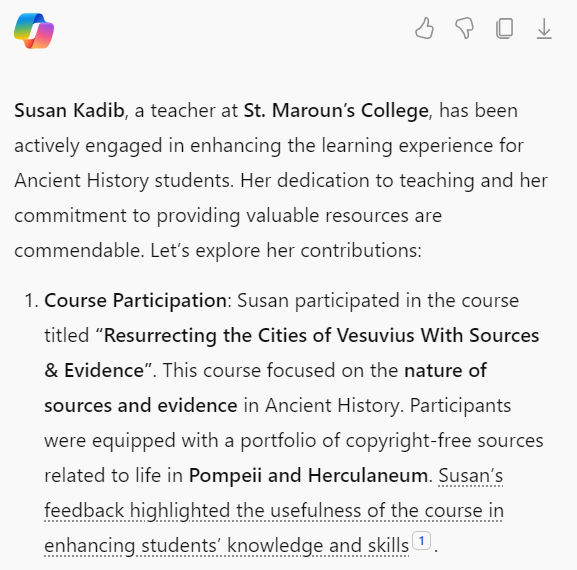So in celebration of the ancient Ides of March (google it if you don’t know), inspiration struck when I decided to interview one of my high school teachers, Susan Kadib. Susan — it was always Ms Kadib to me — taught me Commerce and Legal Studies but has also taught English, Geography, Studies of Religion and most importantly, Ancient History.
I, a Modern History student, have fond memories of arguing aimlessly about my subject’s superiority, and fielding her rebuttals. This is the day I get to do this in print, only with more coherent arguments and a host of history students and staff watching closely.
Here is the Ancient History 2024 HSC non-exam pack.
Valerie Chidiac: Firstly, please introduce yourself to the humble subjects of Honi Soit.
Susan Kadib: As you mentioned, I am a high school teacher and Ancient History fan. I studied Education at Macquarie University, majoring in History and completing a minor in English. I also completed a Certificate in Faith Education at ACU.
VC: What does Ides of March mean to you? Is it Gretchen Wieners saying “we should totally just stab Caesar” or is it merely the 74th day in the Roman calendar?
SK: I actually always think of Shakespeare’s play Julius Caesar because the warning to “Beware the ides of March” actually originated there. Julius Caesar ignores the advice and Shakespeare uses this moment to suggest that Caesar’s hubris contributed to his downfall. I see Caesar’s death as a pivotal moment in history. It forges a dangerous political alliance that ultimately kills the Roman Republic that Caesar’s assassins claimed to be protecting.
VC: You had this tradition of nicknaming students different ancient figures. Even though I was not one of your history students, you called me Cicero before I objected! and you crowned me Zenobia, Queen of Palmyra. What is the criteria you employ when matching historical figures to students?
SK: Most of the time I let students pick a name for themselves at the start of Year 11. It’s my way of trying to get to know them too. Their choices tell me something about the way they see themselves or the personality traits that appeal to them or the ancient figures they are most familiar with. Sometimes students ask me to pick a name for them. I’ll often ask them a few questions and will then come back with a few options for them. I think the students secretly enjoy hearing the reasons behind my choices.
VC: You may not like this, but I googled your name and AI generated the receipts. How do you feel being within the clutches of AI?


SK: Very concerned! But I’m glad that is all AI has on me!
VC: You are well aware that I studied Modern History and advocate its benefits. The floor is yours to argue, unopposed, about the infinitude of Ancient History.
SK: I always say to my students that ‘Ancient History is everywhere’. It’s in our language and in some of our common sayings, our politics, our solar system, our art and architecture, our memes and all over popular culture. I think it’s just such a treat to understand the origins of things that are just normal for us. There’s also something in Ancient History for everyone – political rivalries, devastating conflicts, social and legal reforms, philosophy, scandals, romances, tragedies and just drama, drama, drama. It also teaches us all about the human condition. The world around us has changed so dramatically over the centuries, but we can still relate so much to the individuals we learn about in Ancient History. I always feel so connected to the personalities.
VC: I remember you trying to convince me to study Ancient History because of all the scandals. What is the most scandalous story that has actually made its way into the NSW curriculum? And how is that not gossip?
SK:There are scandalous stories behind almost every Ancient personality. Nero and his mother, Agrippina, are never short of scandal. A lot of what we know probably was gossip!
VC: Troy (2004) was a mandatory film screened for Ancient History students in Room 8. Which historical films actually pass the Kadib test in terms of relative accuracy and rewatchability?
SK: I actually never get sick of Troy. There are many inaccuracies, but I think it does a great job of depicting the traits that Homer gave to a lot of the heroes. Gladiator is also very inaccurate in many ways, but does a great job of depicting the disturbing fascination that the Romans had with the gladiatorial arena.
VC: In one of my units of study — students can guess — The History of the Peloponnesian War by Thucydides was invoked many times when studying Realism. The only thing that rivalled it, was securitisation theory. Have you read Thucydides’ book, and if so, can you sift out the juicy details?
SK: I actually refer quite a bit to Thucydides in my Ancient History lessons (no one has been named Thucydides yet, but I love the name). The rivalry between Athens and Sparta is so interesting and really created quite the divide in Greece — Thucydides places a lot of it in context. I thank Thucydides for all the memes people have created about Athens and Sparta.
VC: When studying the ‘classics’ like Ancient Greece and Ancient Rome, they are romanticised as bastions of ‘Western’ civilisation and European values. How do you as a teacher view this constructed narrative?
SK: They are only one part of the history of Western civilisation, and in many ways, stood in opposition to contemporary Western ideals and values. The Romanticised vision is one that is largely selective. You can’t just pick and choose the parts that you like most, and I think that is what has happened.
VC: And for the final question, do you recommend students study either History at a university level, regardless of the conversations surrounding employment?
SK: Definitely. The skills are so valuable in so many fields. We are inundated with information in this digital age, so it’s become more and more important to learn how to deconstruct information and analyse perspectives.
This is Sparta! (Rapid Fire Questions):
Favourite Year 12 Ancient History unit to teach? The Personality study – Xerxes
Favourite Year 12 Modern history unit if had the opportunity to teach it? Change in the Modern World – Civil Rights in the USA
Underrated ancient period and/or figure? The Gracchi brothers. I don’t think they were underrated in their time, or by modern historians, but most people haven’t heard of them.
Favourite method of historical investigation? Any kind of source analysis.
Cleopatra and Julius Caesar, or Cleopatra and Mark Antony? Cleopatra and Mark Antony
And finally, the mother of all questions, Pride and Prejudice 1995 or Pride + Prejudice 2005? Definitely 1995.





